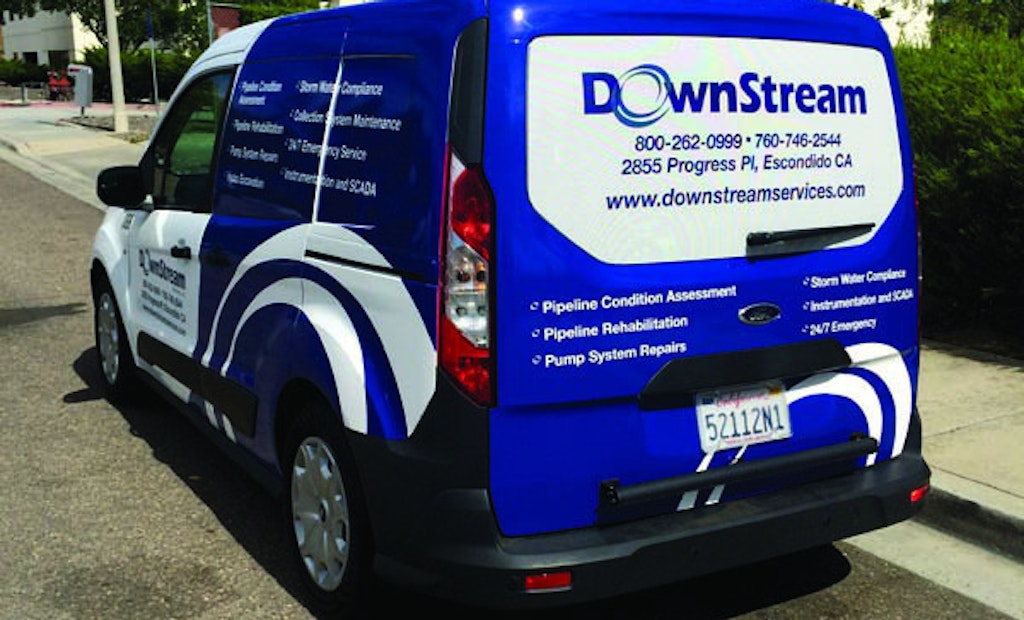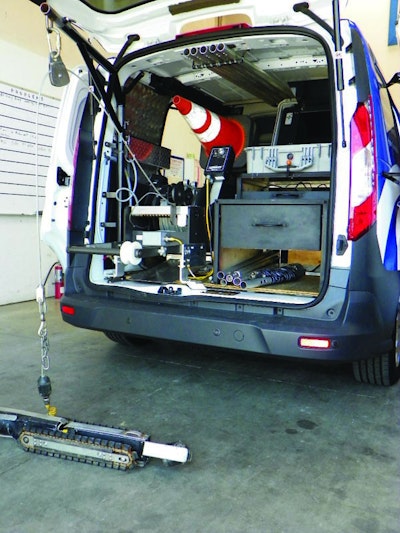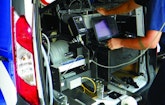
Interested in Location/Detection?
Get Location/Detection articles, news and videos right in your inbox! Sign up now.
Location/Detection + Get AlertsUsing a 4,500 psi trailer jetter to unclog a sink drain is the definition of overkill, akin to killing a mosquito with a shotgun. Managers at Downstream Services Inc. felt the same way every time they dispatched a fully outfitted camera box truck to do relatively small inspections of manholes or mainline pipes.
The solution? A mighty-mite of a specialty camera truck: A 2014 Ford Transit that’s outfitted with a surprising amount of equipment and provides more efficient and cost-effective pipeline televising, primarily before relining pipes or making point repairs, says Victor Roberts, vice president of the San Diego-based company. Downstream primarily offers pipeline and sewer system inspections, assessments, maintenance and rehabilitation services throughout Southern California.
The customized Transit is designed for efficient, one-man operation. Features include a small mechanical boom that swings out from the rear of the vehicle; a wheeled TrackStar II inspection camera system, made by RS Technical Services, with a pan/tilt/zoom camera coupled with an RS Technical mini-mainline controller; and a compact, portable reel that carries 1,000 feet of 5/16-inch-diameter steel cable for reaching remote manhole sites.
“In about two minutes, a technician can pull out the portable reel and Pelican case [which holds the controller] from the truck and do a CCTV inspection,” Roberts says. “Everything is within the operator’s reach, from the winch to the laptop [controller] to all the other gear, including a washdown station. The technician doesn’t need to go to another part of the truck to do anything.
“The technician works off the back of the truck, under the hatch, so he’s not in the blazing sun,” Roberts adds. “The windows are blocked out, too, to keep things cooler. We installed rope LED lights in the interior for nighttime work, as well as a downhole LED spotlight for manhole inspections. The truck also holds a stack of eight traffic cones.”
Downstream normally puts two technicians on an inspection crew, but the company decided to move to one-man crews because under federal prevailing-wages law, Downstream must pay employees up to $82 an hour on government-contract jobs. “At about $650 a day, that’s a huge premium to pay, so we’re moving toward one-person trucks that are safe and ergonomically designed,” Roberts notes. “Most of our competitors now employ one person for CCTV inspections, so doing this helps us be more competitive in the marketplace.”
Another motivator: The Transit boosts the company’s financial bottom line by keeping larger camera trucks out in the field, doing more profitable production inspection work.
“Our five CCTV trucks are working one or two shifts a day,” Roberts points out. “Those trucks are very busy, so it’s difficult for us to commit trucks that are in production mode to smaller inspections. It forced us to charge too much for that service. The Transit is less expensive for us and less expensive for our clients, and allows us to more efficiently allocate our resources.
“At about $150,000 a pop, we don’t want those [larger] camera trucks spending a half a day on a job where a crew is just trying to camera 500 feet of pipe,” he adds. “We can send out a junior operator … because we’re just trying to determine the condition of a pipe or a manhole to make sure everything is ready for lining or a point repair. Junior operators make less money, so we also can charge a more competitive rate.”
Moreover, Roberts figures that the Transit and all the enclosed equipment cost about $75,000, which is roughly half the cost of a fully outfitted camera box truck. “But it can do just about everything that a normal CCTV truck can do,” he adds. “Plus, it’s about 20 to 30 percent cheaper to operate in terms of fuel costs.”
The Transit is a “green” machine too. A 225-amp alternator charges two 12-volt, deep-cell batteries, which in turn operate an inverter that produces 120 volts to run all electronics. The truck can do short inspections – up to one hour – without running the engine. If the batteries run low, an alarm sounds and the operator can start the engine to provide backup power.
Downstream is also installing four 100-watt solar panels capable of producing 22 amps of power, also for operating the inspection system. Even on a partly cloudy day, the operator will be able to run the system without the engine idling. For nighttime work, the special alternator can run all systems with the engine at an idle.
Downstream already owns five other camera trucks: two Mercedes-Benz Sprinter vans, an Isuzu box truck and two Ford vans. Three of the vehicles carry RS Technical pipeline inspection systems; another relies on a mainline inspection system with lateral-launch capability, made by Aries Industries Inc.; and another carries a long-range system, manufactured by Inuktun Services Ltd. and used strictly for inspecting and assessing large-diameter pipes, Roberts says.
To customize the Transit, Roberts says he first did sketches to determine how all the equipment could fit inside. The company then did several mock-ups to see how things would work. Operators used the truck after each version and provided feedback for improvements.
“The first one is always the most difficult,” Roberts notes. “We went through several iterations and we’re still probably not completely done. But we’re excited about the results so far.”







